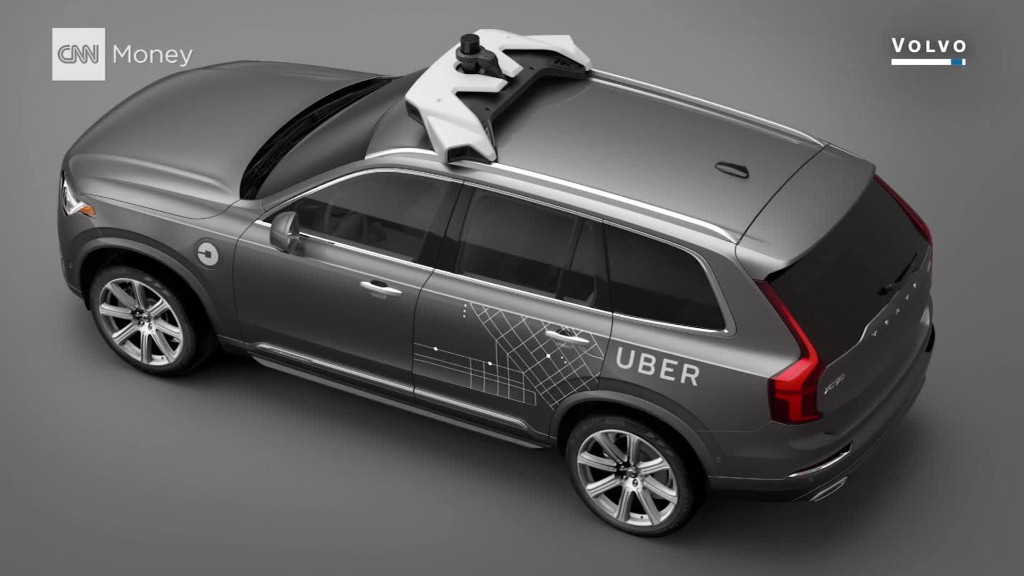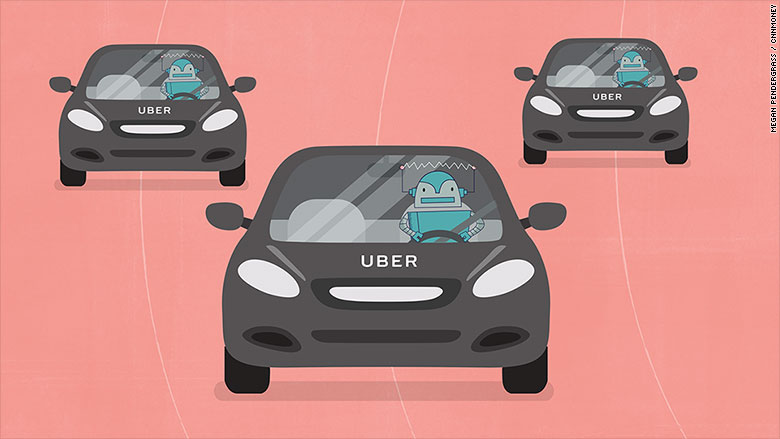
Uber has generated thousands of jobs since launching in 2009. But that trend could be shifting.
The company is feverishly investing in self-driving technology, putting the economic futures of drivers around the world in question.
Uber announced Thursday that it will soon offer rides in self-driving cars in Pittsburgh, a significant step toward rides without a human driver. Uber also announced Thursday that it acquired highly-regarded self-driving truck startup Otto. Uber is ramping up efforts that began last year when it hired scores of robotics experts from Carnegie Mellon University.
For Uber, mastering autonomous driving is a matter of survival. Competitors like Google (GOOGL), Ford (F), Tesla (TSLA), Lyft and GM (GM) have expressed interest in offering self-driving rides. These rides should be cheaper for customers, since there's no need to pay a human driver. If Uber doesn't embrace cheap, autonomous transit, it will likely fall out of favor with customers.
"This is everything. This is all the marbles for Uber," chief executive Travis Kalanick told the Associated Press Thursday.

Uber has 600,000 drivers in the United States and 1.5 million around the world. But experts in robotics and automation see these driving jobs as on the chopping block. Such roles won't last in a world where computers and robots are rapidly getting smarter and faster.
"Why would you pay $60 for a ride to the airport when you can pay $20?" said Vasant Dhar, a professor at New York University's Stern School of Business. "Do you really want to pay an extra $40 for the privilege of having a human drive you? I don't think so."
Related: Elon Musk's push for autopilot unnerves some Tesla employees
Scott Santens, a writer who has written viral stories on the impact of artificial intelligence on humanity, thinks Uber could potentially be directly responsible for eliminating over 10 million jobs in the United States. Santens believes a basic income for all citizens is necessary, and moderates a popular Reddit forum on the topic.
There are 7.3 million people employed in the trucking industry, according to the American Trucking Association. Of these 3.5 million are drivers. Santens argues a large percentage of those jobs will disappear as Uber disrupts the industry with its technical prowess, just as its Silicon Valley cohorts have brought automation to other industries.
That would be a far different reality than the uplifting, job-rich narrative Uber has touted to cities around the globe as it sought to expand and avoid government scrutiny.
In May 2014, Uber said it was generating 20,000 new driver jobs every month. Then in 2015, Uber said it could create 50,000 new jobs in Europe if cities partnered with it. Uber also said it could create one million jobs worldwide in 2015. It's unclear if the claim has come to fruition. Uber did not immediately respond to a request for comment.
Related: Uber will soon offer free rides in self-driving Volvos
Kalanick still sees a rosy future for drivers. In a recent interview with Business Insider, he argued that in an autonomous world the number of human drivers would go up.
Kalanick suggested that a city that transitioned to self-driving cars would still need humans to drive difficult routes that driverless cars couldn't handle.
Santens warned that while there might be more Uber drivers in such a circumstance, the number of human drivers overall would drop.
With fewer cars in a city, there would also be less demand for dealerships, repair shops and car washes -- leading to even more job losses.
Exactly when a potential nightmare situation for drivers will unfold is unclear. Estimates range from a couple years to as many as 30. It's tough to assess progress with so much work happening in secret, according to Karl Brauer, senior director of insights for Kelley Blue Book.
Related: How Uber punishes drivers who refuse to use UberPool
A rollout of self-driving vehicles would likely happen in stages, with the cars first being limited to roads that are easiest to drive on.
How much despair we should have over these lost jobs is debated. Some experts point out that most Americans once worked on farms, but the country's population found new jobs and a higher standard of living even after those jobs disappeared.
And new technologies have traditionally created some new jobs too.
Tasha Keeney, an industrial innovation analyst with ARK Investment Management, suggested the likelihood of some drivers transitioning to jobs in call centers where they would manually take control of confused self-driving cars that were in situations they couldn't handle.

